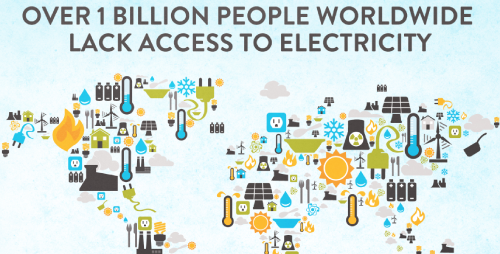18% of the worldwide population, or 1.3 billion people, don't have access to electricity, according to the OECD. And, nearly 40% (2.7 billion people) still rely on traditional biomass (wood, charcoal, agricultural waste and animal dung) for cooking. Most of these people are in Sub-Saharan Africa and developing Asia, regions that are experiencing large economic and populations growth.
"Development of human capital is crucial in enabling progress towards modern industrial society. It is also nearly impossible to make significant progress without adequate, affordable and uninterrupted access to energy and services." -- IAEA Report on Climate Change and Nuclear Power 2015
Access to electricity allows for the refrigeration of food, thus reducing the risk of food shortages. Organizations have access to information technologies with electricity and computers, further enhancing education and communication. Energy is also a major contributor to improving access to modern medicine.
Population growth and rapid urbanization will drive upward pressure on energy demand in developing countries, this will have a major impact on the environment. The magnitude of this impact on climate change will strongly depend on policy measures undertaken by governments.
Governments and international organizations are working together to tackle the global development and energy challenge through the UN Sustainable Development Goals. In addition, a new legal instrument on climate change will be prepared and approved at the 21st Conference of the Parties (COP21) in Paris this December, superseding the Kyoto Protocol.
A plan is needed to keep the "2-degree" scenario, meaning that we must control the emissions of greenhouse gases so that the increase of global average temperature will not exceed 2°C relative to pre-industrial levels. This will take a comprehensive plan of action involving sustainable development, energy efficiency, and, most importantly, extensive use of clean energy.
For more information, check out the 2015 IAEA Report on Climate Change and Nuclear Power.


 RSS Feed
RSS Feed

